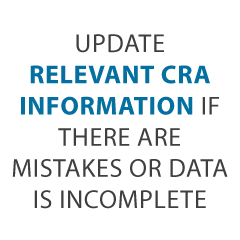- Connect With Us!
- (877) 600-2487
- info@creditsuite.com
The Credit Rating for Business Decoded
Published By Janet Gershen-Siegel at July 2nd, 2018
Need a Credit Rating for Business Decoded?
What is your business credit rating? Do you know what the numbers mean? Does your business have a good commercial credit score? If you’re unsure, don’t fret. You just need a credit rating for business decoded.
So you are presently in business, and trying to keep on top of your company credit scores. Or possibly you aren’t, and feel now is a good time to start. Or maybe your business is reasonably new, and this is the first time you’re doing this.
Regardless of your situation, you have most likely asked this question at least once – are my scores any good?
Let’s take a look at the three business credit reporting agencies and solve this mystery at long last.
Experian Business Credit Rating for Business Decoded
Experian’s scoring system is called Intelliscore Plus. http://www.experian.com/business-information/credit-risk-management.html Let’s get the Experian credit rating for business decoded.
What is the Intelliscore Plus Credit Score?
The Intelliscore Plus credit score is a statistically based credit-risk analysis. The crucial objective of Intelliscore Plus is to help businesses, investors, and possible future lenders make smart judgments about who they should or should not do business with.
Like an automobile dealership makes use of a consumer’s FICO score to rapidly establish just how much of a credit risk a prospective customer might be, the Intelliscore Plus credit score can give insight on how much of a credit risk a company or business owner might be.
Intelliscore Plus Credit Score Range
The Intelliscore scores range from 1 to 100. So the higher your score, the lower your risk class. The chart below details each Intelliscore Plus credit score range as well as its associated meaning. This is the Intelliscore Plus credit rating for business decoded.
Score Range/Risk Class
- 76 – 100 Low
- 51 – 752 Low – Medium
- 26 – 503 Medium
- 11 – 254 High – Medium
- 1 – 105 High
Computing an Intelliscore Plus Credit Score
In the credit world, Intelliscore Plus is deemed one of the most dependable tools in successfully forecasting risk. One of the ways Intelliscore Plus maintains this claim to fame is by acknowledging the significant variables that reveal if a company is likely to pay their debts.
Though there are over 800 commercial and owner variables constituting an Intelliscore Plus credit score, the variables can be broken down into these essential factors:
Payment History
The bureaus call this recency but in the real world, it’s nothing more than your current payment status. This includes the amount of times your accounts become delinquent, the number of accounts that are currently delinquent, as well as your overall trade balance.
Frequency
Much like payment history, frequency make up the quantity of times your accounts have been sent out to collections, the quantity of liens as well as judgments you may have, and any bankruptcies connecting with your business or personal accounts.
Frequency can also include information associating with your payment patterns. Were you routinely slow or late with payment? Did you start off paying expenses late, however over time, stopped doing so? These variables will certainly all be taken into consideration.
Monetary
This specific element focuses on just how you make use of credit. For example, just how much of your offered credit is currently in operation? Do you have a high proportion of delinquent balance in contrast with your credit line?
If you will begin a business or are fairly new to this game, the listing above might appear a bit overwhelming. If you have not begun or do not have a lengthy history of company-based transactions, how will Intelliscore Plus rate you?
Intelliscore Plus takes care of these situations by using a “blended model” to develop your rating. This indicates that they take your personal credit score right into consideration when determining your business’s credit score.
Find out why so many companies are using our proven methods to improve their business credit scores.
Dun & Bradstreet’s PAYDEX Business Credit Rating for Business Decoded
A PAYDEX Score from Dun & Bradstreet ranges from 0 to 100. This score has a basis in payment information which is on report to the bureau. Or it is on report to data-gathering companies partnering with the CRA. https://creditreports.dnb.com/m/business-glossary/paydex-score.html
D & B uses this information, in addition to a credit score and Financial Stress Score, so as to advise just how much credit a lending institution should extend to your business. Let’s get the D&B PAYDEX credit rating for business decoded.
Getting a PAYDEX Score
To get a PAYDEX score, file for a DUNS number on Dun & Bradstreet’s website. The number is free.
In addition the agency must have reports of your payments with four or more vendors. Your business’s PAYDEX score shows if your payments are often made on time or ahead of schedule. As you might expect, a higher number is better. The scores work out as follows:
- 80-100: A low risk of late payments.
- 50-79: A medium risk of late payments.
- 49: A high risk of late payments.
Your business’s credit score ranges from 1 to 5. 1 is the best score. This matches your business with other businesses with similar payment histories. It shows how often those businesses tend to pay on time. This can help lenders understand your business’s standing. However, it does not really show all of the payment data from your business.
D&B Business Credit Scores
Your business’s credit score runs from 1 to 5. 1 is the very best score. This matches your business with various other companies with comparable payment histories. The score demonstrates just how typically those firms have a tendency to pay without delay.
This information can actually assist lending institutions to recognize your company’s standing. But it does not truly reflect every one of the payment records from your business.
D&B Financial Stress Score
The Financial Stress Score likewise runs from 1 to 5. It matches your company with other firms sharing similar financial and business qualities.
These resemblances are in areas such as size or amount of time in business. This score demonstrates how frequently those companies have a tendency to pay in a timely manner. As before, 1 is the best score. This score is a much more detailed examination of the business landscape, versus an analysis of your business’s actual payment history.
An amazing PAYDEX score for your business is 80 – 100.
Find out why so many companies are using our proven methods to improve their business credit scores.
Equifax Credit Rating for Business Decoded
Equifax displays three separate business determinations on its business credit reports. These are the Equifax payment index, your company’s credit risk score, and its business failure score.
Much like the PAYDEX score, Equifax’s payment index, on a scale of 100, shows how many company payments were on time. These include both information from creditors and vendors. Nevertheless, it’s not meant to predict future activity. However, that is what the other two scores are for. Let’s get the Equifax credit rating for business decoded.
Equifax Business Credit Rating for Business Decoded: Specifics
The Equifax Credit Risk Score originates from a model which they use to rate particular risks. Equifax uses these details in its computations, consisting of the depth of the credit info Experian can obtain, the length of your business’s credit history, and your business’s payment delinquency history. http://www.equifax.com/business/equifax-risk-score
http://www.equifax.com/assets/USCIS/efx-00178_efx_risk_score.pdf
http://www.equifax.com/assets/USCIS/efx-00164-9-13_efx_bni.pdf
Equifax then sections some five different scorecards together, by using statistical analysis. In order to improve their accuracy, Equifax suggests combining their Credit Risk Score with their exclusive Equifax Bankruptcy Navigator Index.
The Bankruptcy Navigator Index helps forecast the chance of your business going bankrupt in the next 24 months. Equifax bases its predictive model on over 270 million separate accounts.
Equifax displays three separate company determinations on its commercial credit reports. These are the Equifax Payment Index, your company’s Credit Risk Score, and its Business Failure Score.
Equifax Credit Risk Score
Equifax’s Credit Risk Score assesses just how likely it is your company will come to be seriously overdue on payments. Scores range from 101 to 992, and they evaluate:
- Available credit limit on revolving credit accounts, e. g. credit cards
- Your business’s size
- Proof of any kind of non-financial transactions (e. g. supplier invoices) which are delinquent or were on charge off for two or more billing cycles
- Length of time since the opening of the earliest financial account
Find out why so many companies are using our proven methods to improve their business credit scores.
Equifax Business Failure Score
Lastly, Equifax’s Business Failure Score takes a look at the risk of your company closing. It ranges from 1,000 to 1,600, reviewing these aspects:
- Total balance to total current credit limit average utilization in the previous three months
- The length of time since the opening of the oldest financial account
- Your company’s worst payment status on all trades in the previous 24 months
- Documentation of any non-financial transactions (e. g. supplier invoices) which are overdue or have gotten on fee off for two or more billing cycles.
For the credit risk and the business failure scores, a score of 0 means bankruptcy.
A decent Equifax score for your business is as follows:
- Payment Index 0-10
- Credit Risk score 892-992
- Business Failure score 1400-1600
Equifax Payment Index
Similar to the PAYDEX score, Equifax’s Payment Index, which has its measurement on a range of 100, demonstrates how many of your business’s payments were made punctually. These consist of both information from credit issuers and vendors.
However it’s not meant to forecast future habits. That is what the other two ratings are for.
Equifax Scoring Analysis
For the credit risk and business failure scores, a rating of 0 means bankruptcy.
An outstanding Equifax score for your company is as follows:
- Payment Index 0 – 10
- Credit Score 892 – 992
- Business Failure Score 1400 – 1600
Get Your Credit Rating for Business Decoded Because it Will Help Your Company for a Long Time to Come
Regardless of what your credit score is, it is important that you remain to be thorough and assess your personal and business credit reports. This can help you find possible problems and stay educated on your own credit profile.
When you recognize where to check your business credit score, you have a far better chance of getting on top of it, and staying there.
Take advantage of your credit rating for business decoded. Keep your scores up and good things will happen. Learn more here and get started toward building business credit attached to your company’s EIN and not your SSN.

 " class="attachment-blog-single size-blog-single wp-post-image" alt="Get Business Credit Cards for New Businesses Credit Suite-Business Line of Credit Decoded" title="Get Business Credit Cards for New Businesses">>
" class="attachment-blog-single size-blog-single wp-post-image" alt="Get Business Credit Cards for New Businesses Credit Suite-Business Line of Credit Decoded" title="Get Business Credit Cards for New Businesses">>
